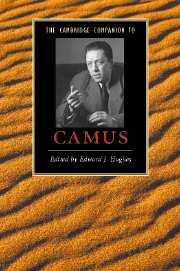Book contents
- Frontmatter
- Introduction
- PART I: BIOGRAPHY AND INFLUENCES
- PART II: THEMES, PREOCCUPATIONS AND GENRES
- PART III: TEXTS AND CONTEXTS
- 11 From Noces to L’Etranger
- 12 Layers of meaning in La Peste
- 13 Withheld identity in La Chute
- 14 Le Premier Homme and the literature of loss
- Postface
- Guide to Further reading
- Index
- Series List
14 - Le Premier Homme and the literature of loss
from PART III: - TEXTS AND CONTEXTS
Published online by Cambridge University Press: 28 September 2007
- Frontmatter
- Introduction
- PART I: BIOGRAPHY AND INFLUENCES
- PART II: THEMES, PREOCCUPATIONS AND GENRES
- PART III: TEXTS AND CONTEXTS
- 11 From Noces to L’Etranger
- 12 Layers of meaning in La Peste
- 13 Withheld identity in La Chute
- 14 Le Premier Homme and the literature of loss
- Postface
- Guide to Further reading
- Index
- Series List
Summary
Ce qu'ils n'aimaient pas en lui, c'était l'Algérien.
(PH, 318)What they did not like in him was the Algerian.
(FM, 253)The focus of this final chapter will be Camus's unfinished text Le Premier Homme, published posthumously in 1994, and the exploration of his relationship to Algeria in a narrative concerned with personal origins, family, and the history and the present of a community.
Born into the poor pied-noir community in Algeria in 1913, Camus in his literary exploration of identity necessarily engages not only with a personal history, but also with the collective histories of North Africa and of European colonialism, and specifically with the political, social and cultural configuration of 'French Algeria'. Those collective histories are integral to an understanding of the plural nature of the Maghreb. In those short stories in L'Exil et le Royaume (1957) which explicitly take the country of his birth as their context, an increasingly troubled relationship with the Algeria of the period is already evident. The emphasis here will be on Le Premier Homme as a work of the imagination. Just as Camus's imagination was haunted in the late 1950s by the increasing violence of the Algerian War of Independence and the political polarisation it brought, so this literary expression of impossible return and potentially irretrievable loss continues to haunt the imagination of readers, critics and writers. This 'return to Camus' took various forms in the 1970s, 1980s and especially the 1990s following the immense international publishing success of Le Premier Homme in 1994, and of Olivier Todd's biography in 1996.
- Type
- Chapter
- Information
- The Cambridge Companion to Camus , pp. 191 - 202Publisher: Cambridge University PressPrint publication year: 2007
- 2
- Cited by

